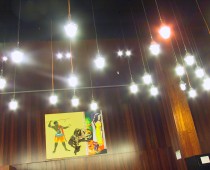January 2018. Coming to a lecture hall near you.
CC- GS can register Spring 2018 for course: BUSI UN3704 http://www.columbia.edu/cu/bulletin/uwb/subj/BUSI/UN3704-20181-001/
Problems registering? Email me [email protected]
What’s it about? http://knote.com/p/F5cMly/Venturing–Making-History-aka-
———
The philosophers have only interpreted the world in various ways; the point, however, is to change it.
Karl Marx, Theses on Feuerbach
Technology-driven startups are making history.
Making history was once for princes and priests. Since the Renaissance, for generals, politicians, scientists and explorers. Today innovation and technology are the forces changing the world: inventors, engineers, startup founders, radicals and movements. This puts the power in the hands of upstarts, working on new ideas and building huge new organizations: commercial or socially-driven.
We live in the age of Apple, Google, Facebook, Amazon and you. Your idea to change the world.
Building on the survey course (Venturing to Change the World), we explore advanced topics in creating successful organizations in an age of accelerating change. As innovation is moving from an accidental, artisanal process to a large-scale societal machinery, there are common methods and problems.
We examine competing ideas from Ancient Greece to Silicon Valley, drawing on philosophy, economics, history, sociology, engineering, finance and management topics that animate powerful commercial and social ventures. We put one foot in the canon, and the other deep in the cutting-edge thinking of frontline practitioners — venture capitalists, startup founders, and real-time critics.
Scientific discoveries, innovation and evaluating the potential for new ventures: Rapid change creates opportunities, but selecting and developing the right ones is difficult. We’ll examine the innovation process itself, and look deeply at two technology revolutions underway for the next decade (synthetic biology, artificial intelligence).
Leadership and creating organizations: Building the apparatus of change means creating upstart teams, then scaling them into institutions. The job of leader is unique. We’ll examine the techniques of leaders from the Peloponnesian War to Gandhi to Apple.
How ideas become the built-world: Until the mid-20th century, little of the world was designed or engineered and produced for global consumption. Today, virtually every object we encounter in society is a designed and mass-produced artifact. We’ll consider the new art and science of product design and engineering management, and how to deploy it to create global impact.
Economics, finance, and fundraising for innovation and ventures: Ventures need to work economically, and we’ll understand the tools of financial analysis and the social science drivers of business models, fundraising, financial markets, and deals.
This course is not a practicum for trial and error learning. It is a review of the theoretical and historical knowledge of how leaders seize opportunities to change the world.
Keywords: science, technology, innovation, management, finance, fundraising, operations research, organizational behavior, ethics, social impact, leadership, philosophy.
// Amol Sarva, Ph.D. // @amol // 530-727-8277
// Blog daily // Knote make plans // Knotel your HQ
